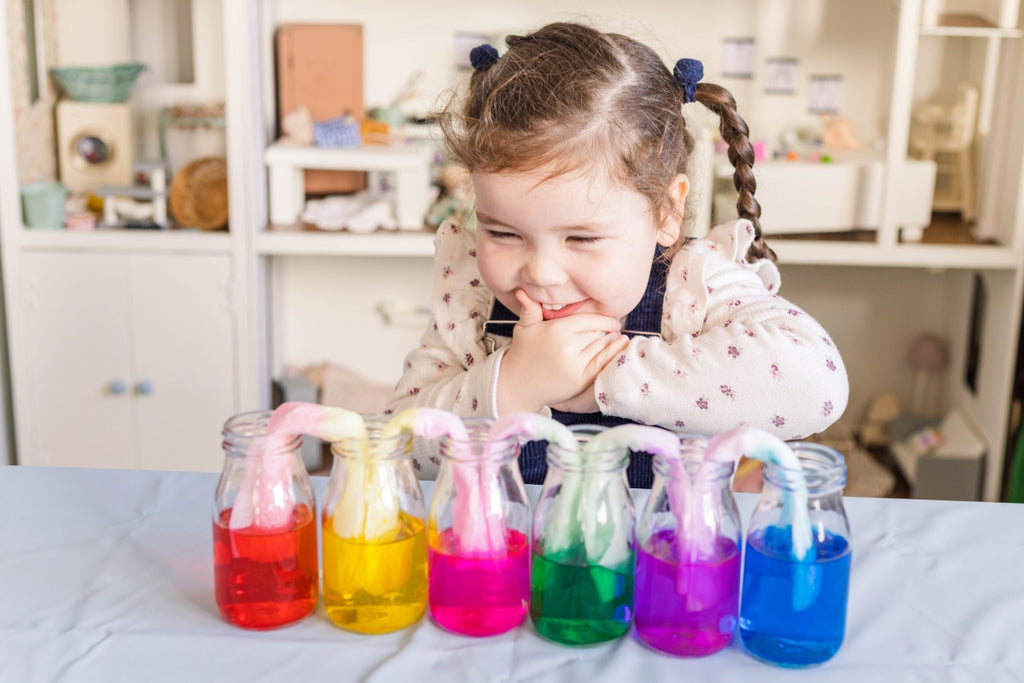Exciting Science Experiments for Kids: Fun Learning for Young Minds
Introduction: The Magic of Science Experiments for Kids
Science experiments for kids are not just fun, they are powerful tools for sparking curiosity and learning. Hands-on activities help children explore the natural world around them, making abstract concepts more tangible and engaging. Whether you’re looking for simple experiments at home or science projects for school, there’s a wide range of fun and educational activities to choose from.
The best part is that kids don’t need to be lab experts to enjoy these experiments. They just need a little guidance and creativity to unlock their inner scientist. Here are some easy and exciting science experiments that will keep kids entertained while learning valuable lessons in science.

1. The Benefits of Science Experiments for Kids
Science experiments are a fantastic way to teach kids about important STEM concepts. Here are some key benefits of incorporating science experiments into your child’s learning routine:
-
Encourages Curiosity: Kids are naturally curious, and science experiments help channel this curiosity into structured learning. By asking questions and seeking answers, children develop critical thinking skills.
-
Hands-On Learning: Experiments allow children to engage in learning through their senses. Whether they’re observing changes in color, temperature, or texture, they’re getting a first-hand experience of scientific phenomena.
-
Boosts Problem-Solving Skills: Many science experiments involve trial and error. Kids learn how to solve problems, think critically, and understand that failure is just a step toward success.
By integrating science experiments into their education, children develop a love for learning that can last a lifetime.
2. Fun and Easy Science Experiments for Kids
There’s no shortage of fun science experiments for kids that require minimal materials and can be done in the comfort of your home. Let’s dive into a few simple yet fascinating experiments that children will love:
1. Baking Soda and Vinegar Volcano
One of the most classic science experiments for kids, the baking soda and vinegar volcano demonstrates the chemical reaction between an acid and a base. Here’s how to do it:
Materials Needed:
-
Baking soda
-
Vinegar
-
A small bottle or container
-
Food coloring (optional)
Steps:
-
Place the baking soda inside the bottle.
-
Add a few drops of food coloring for extra fun.
-
Pour vinegar into the bottle and watch the eruption!
This experiment teaches kids about chemical reactions in a visually exciting way.
2. Rainbow in a Jar
This simple experiment helps kids learn about density and how liquids of different densities behave when combined.
Materials Needed:
-
Honey
-
Dish soap
-
Water
-
Vegetable oil
-
Rubbing alcohol
-
Food coloring (optional)
Steps:
-
Pour each liquid into a clear jar, starting with the densest liquid (honey) and finishing with the least dense (rubbing alcohol).
-
Add food coloring to the water and rubbing alcohol to make the rainbow effect even more vibrant.
-
Watch as the liquids form colorful layers!
This experiment helps children understand the properties of liquids and their ability to mix based on density.

3. Floating Egg Experiment
This experiment is a fun way to demonstrate the concept of buoyancy.
Materials Needed:
-
An egg
-
Salt
-
Water
-
A glass or bowl
Steps:
-
Fill a glass with water and place an egg inside. It will sink to the bottom.
-
Gradually add salt to the water, stirring gently.
-
Watch as the egg begins to float!
The salt increases the water’s density, causing the egg to float. This simple experiment offers a great visual explanation of buoyancy.
3. Why Science Experiments Are Great for Kids’ Development
Science experiments are more than just fun activities. They offer significant developmental benefits for children. Here’s how they contribute to a child’s growth:
-
Improves Cognitive Skills: Science experiments stimulate the brain by encouraging curiosity and problem-solving. As kids work through the steps of an experiment, they learn to think logically and analyze results.
-
Enhances Motor Skills: Many science experiments involve manipulating objects, pouring liquids, or assembling materials, which improves fine motor skills.
-
Fosters Creativity: Science experiments often require kids to think outside the box. They might need to adapt or tweak their experiments, sparking their creativity and imagination.
Overall, science experiments are a comprehensive learning experience that builds a wide range of skills, from analytical thinking to creativity.
4. Making Science Fun with Toys and Kits
In addition to simple DIY experiments, there are many science toys and kits designed to help kids explore science in a fun, hands-on way. Some examples include:
-
Chemistry Sets: These kits provide everything a child needs to perform safe chemical reactions. They often come with colorful ingredients and instructions to create fizzing potions, colorful liquids, and more.
-
Robotics Kits: Kids can build their own robots and learn about engineering, coding, and robotics in the process. These kits often include building materials and guides for creating working robots.
-
Magnet Sets: Magnets are a fantastic way to teach children about forces and fields. Many kits come with a variety of shapes and sizes, allowing children to experiment with magnetic properties.
These tools not only make science fun but also teach kids about STEM concepts in a hands-on and interactive way.

5. Science and Learning: How It Affects Kids’ Education
Engaging in science experiments provides a great foundation for academic success. Here’s why science is crucial in early education:
-
STEM Education: Learning science at a young age sets the stage for further exploration of STEM (Science, Technology, Engineering, and Math) fields. Early exposure helps children build the skills they’ll need for future academic and career paths in these high-demand fields.
-
Practical Knowledge: Science experiments teach kids valuable practical knowledge. They learn how to make observations, record data, and analyze results, which are all essential skills in education and life.
-
Critical Thinking: Science experiments require children to hypothesize, test, and reflect on their findings. This nurtures critical thinking, helping children make better decisions and solve problems more effectively.
The skills developed through science experiments can help kids excel not only in science but across various subjects.
6. Frequently Asked Questions (FAQs)
Q1: Are science experiments safe for kids?
A1: Yes, most science experiments for kids are completely safe when done with proper supervision. Always follow the instructions carefully, use child-safe materials, and supervise children during the experiment to ensure their safety.
Q2: What age is suitable for science experiments?
A2: Science experiments can be adapted for kids of various ages. For younger children (ages 3-6), simple activities like baking soda volcanoes or mixing colors are perfect. Older kids (ages 7-12) can tackle more complex experiments involving chemistry or physics concepts.
Q3: How do science experiments help kids learn?
A3: Science experiments teach kids problem-solving, critical thinking, and the scientific method. By engaging directly with scientific concepts, children learn to observe, hypothesize, experiment, and analyze, which strengthens their understanding of the world.
Q4: Can I do science experiments at home without fancy equipment?
A4: Absolutely! Many science experiments use common household items like baking soda, vinegar, salt, and food coloring. There are plenty of creative and fun science activities that require minimal or no special equipment.
Conclusion: Unlock the Wonders of Science for Your Kids
Science experiments for kids are a fantastic way to make learning exciting. From simple baking soda volcanoes to exploring buoyancy with floating eggs, these hands-on activities not only make science fun but also help children develop crucial skills. By engaging with science, children grow curious, creative, and confident, paving the way for future learning and academic success.
So, why wait? Start exploring the amazing world of science with your kids today and watch their love for learning soar!









